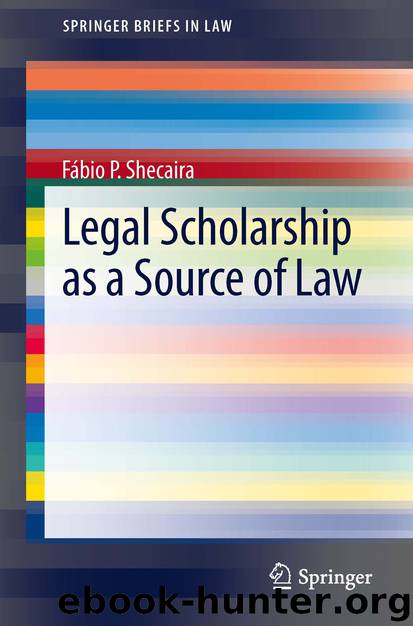Legal Scholarship as a Source of Law by Fábio P. Shecaira

Author:Fábio P. Shecaira
Language: eng
Format: epub
Publisher: Springer International Publishing, Heidelberg
First, a terminological note is in order. I do not use the word “authority” quite like Rubin does. You will recall that, for me, a norm is fully authoritative if and only if it provides a content-independent reason for action which normally defeats conflicting substantive reasons not to act as the norm requires. Thus, I would have no problem with the claim that legal scholarship is not typically authoritative if that is understood to mean that legal scholarship typically provides content-independent reasons which are not especially weighty (although later I will take issue with the view that legal scholarship does not ever issue authoritative reasons). But when Rubin denies authoritative status to legal scholarship he also refuses to acknowledge that legal scholarship can realistically9 be associated with content-independent reasons for action. For Rubin, legal scholarship’s impact on legal decision-making is always dependent on its ability to persuade the decision-maker. That a particular scholar said so is never by itself a reason for action. What the scholar says must persuade in order for it to generate reasons for action.
To concede this point to Rubin would be to deny the possibility that legal scholarship may function as a genuine source of law. For I have defined a source of law as possessing the capacity to issue norms which function as content-independent reasons for action. That a particular scholar said so must be capable of generating a reason for action, whether what was said by the scholar strikes one as argumentatively compelling or not. Now, I do not want to deny that the authority of legal scholarship is usually in some way connected to the perceived quality of its content. But the connection is not always as direct as Rubin imagines. Consider what Schauer has to say about the issue:Although optional authorities are sometimes selected because they are persuasive, more often they are selected as authorities because the selector trusts the authority as an authority even if he does not agree with the conclusion, or more likely, believes himself unreliable in reaching a conclusion on which the authority, whether commentator or other court, is thought more reliable (2009, 71).
We can now see that a common use of an optional authority is not one in which the judge is persuaded by the substance of what an optional source says, but instead is one in which she is persuaded that the source is more likely to be right than she would be if she made her own decision (ibid. 72).
Download
This site does not store any files on its server. We only index and link to content provided by other sites. Please contact the content providers to delete copyright contents if any and email us, we'll remove relevant links or contents immediately.
The Social Psychology of Inequality by Unknown(3009)
The Plant Paradox by Dr. Steven R. Gundry M.D(2597)
The Writing on the Wall by Anselm Jappe(2030)
Working for Yourself by J.D. (Nolo) Stephen Fishman(1858)
Every Landlord's Legal Guide by Janet Portman & Stewart Marcia & Ralph Warner(1660)
The First 20 Hours: How to Learn Anything ... Fast by Kaufman Josh(1649)
Get What's Yours for Medicare by Philip Moeller(1641)
ADHD on Trial by Michael Gordon(1565)
Decisive by Chip Heath(1557)
Working for Yourself by Stephen Fishman J.D. (Nolo)(1517)
Drafting Contracts: How and Why Lawyers Do What They Do, Second Edition by Stark Tina L(1480)
Restitution by Restitution(1423)
A Practical Guide to International Arbitration in London by Hilary Heilbron(1422)
The Lord of the Rings: The Fellowship of the Ring, the Two Towers, the Return of the King by J. R. R. Tolkien(1421)
The Economist Aug 8th 2015 by The Economist(1409)
Intellectual Property Strategy by John Palfrey(1408)
The Economist Aug 29th 2015 by The Economist(1372)
Collusion by Luke Harding(1308)
Persuasion by Owner(1286)
